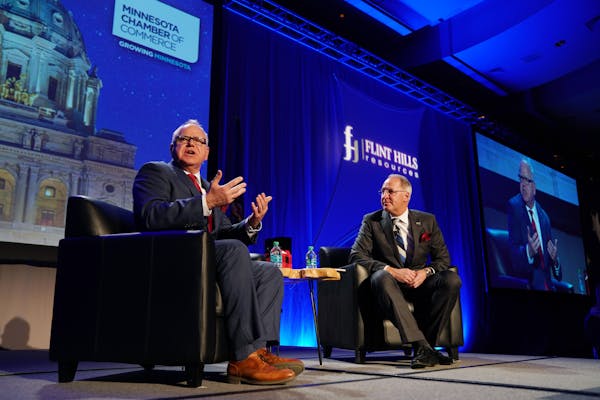New gun safety rules. Mandated paid sick time for workers. Free menstrual products for students.
Several new laws passed by the DFL-controlled Minnesota Legislature in 2023 are set to take effect on Jan. 1. Here are some of the most notable changes Minnesotans will see in the new year.
Public safety:
Family members and law enforcement can now petition for an extreme risk protection order — also known as a red flag gun confiscation order — if someone with a firearm is believed to be in danger to themselves or others. Other gun safety changes, including expanded background checks, took effect earlier in 2023. Also, staff at juvenile detention facilities can't conduct a strip search without specific contraband concerns and can't isolate juveniles as punishment.
Sick time:
One of the most debated measures at the Legislature that takes effect Jan. 1 is sick and safe time. Employers have to allow workers up to 48 hours of paid sick time a year to care for their mental or physical health or care for a family member. It applies for all employers with one or more employees, and covers all employees, including part-time and temporary workers, who work at least 80 hours in a year. Companies with more generous sick time policies can continue to offer those. A separate paid family and medical leave program isn't scheduled to roll out until January 2026.
Education:
School districts must stock bathrooms with free menstrual products. The legislation's sponsor said students experiencing "period poverty" regularly opt to skip class when they don't have access to pads or tampons, which hurts their academic performance. A sweeping education bill earmarked $2 per student, about $2 million a year, for the measure.
Drivers:
Need a new license plate? You can now pay extra to get specialty license plates commemorating Minnesota's six professional sports teams: the Vikings, Wild, Twins, Timberwolves, Lynx and United. The money from the plates, which were designed by each pro team, will support the sports teams' charitable foundations. The new plates are part of nine new special license plates the state has added in 2024 — the most released in one year — and each costs $15.50 plus a minimum annual contribution of $30.
The Lions Club International will have a specialty plate, with funds benefiting its charitable foundation. And another plate will commemorate Minnesota Missing and Murdered Indigenous Relatives (MMIR), with funds going to the Gaagige-Mikwendaagoziwag (which means "they will be remembered forever" in Ojibwe) reward account to bring attention to cases. Residents also have requested Blackout plates featuring a black background with white text, which other states have, and those funds will support the Department of Public Safety's Driver and Vehicle Services.
All of the new plates will be available Jan. 1, except the specialty plates for the Wild, Minnesota United and MMIR, which will be available in early 2024. The state has 123 different special plates and has issued about 143,000 special plates to drivers this year. In addition, starting Jan. 1, the department will add real-time information online about driver's exam appointments and the Office of Traffic Safety can voluntarily collect race and ethnicity data of driver's license applicants.
Food safety:
PFAS chemicals, known as "forever chemicals," are banned for food and beverage packaging, such as fast-food burger wrappers and microwave popcorn bags. Some of the thousands of PFAS chemicals are commonly used, and still federally allowed, as a grease-resistant or waterproof coating for paper food wrappers, pizza boxes and take-out containers. Minnesota is one of 11 states that have banned such uses in the coming year.
Housing:
Churches can now add micro-unit dwellings to their property to house homeless residents. New protections will also be implemented for renters, including requiring a landlord to inform them how much they owe in rent and discuss their rights before bringing an eviction action.
Political contributions:
Starting with 2024 donations, Minnesotans can get a higher tax refund for political contributions to Minnesota political parties and candidates for state offices. The tax refund was increased from $50 to $75 for individuals, and from $100 to $150 for joint filers. A campaign finance provision in a broader election law restricting election spending by companies with foreign ownership was set to take effect Jan. 1, but has been blocked by a judge.
Workers:
Employers can't ask job applicants to disclose their pay history, though applicants can voluntarily provide the info. The legislation drew opposition from some business groups. But supporters said the rule, which 18 other states already have, will help eliminate gender and racial pay gaps by having employers rely on an applicant's skills and qualifications to determine pay.
In addition, employers with more than 50 full-time employees must display a poster with information on veterans benefits. Meat-processing employers have to start a program to minimize and prevent musculoskeletal disorders. And Minnesota's two oil refineries must follow new workplace training requirements.

Want to share info with the Star Tribune? How to do it securely

'Safe recovery sites' would offer syringes, naloxone and more to people using drugs. The plan could be in peril.
New Minnesota GOP leaders seek peace with party's anti-establishment wing

Who is Republican Lisa Demuth, Minnesota's first House speaker of color?

